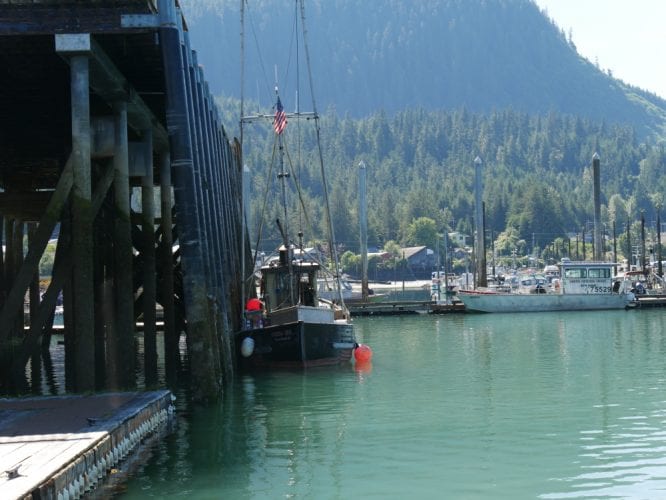The good news for commercial salmon trollers in Southeast Alaska is they will have a winter season for king salmon starting up next month; the bad news is that winter season may be shortened this year. Trollers have been concerned over the possibility of no winter season and what low king numbers mean for the future of the fishery.
The Alaska Department of Fish and Game announced September 20 that the winter troll season will open October 11th. It could remain open through the end of December but managers will have to wait and see about fishing opportunity later in the winter.
“You know obviously there’s been a lot of angst in the fleet and rumors going that we wouldn’t open winter,” said Grant Hagerman, the department’s troll management biologist for Southeast. “Wanted to get this out as soon as we could. Typically the winter news release doesn’t come out til October and that’s just, hey we are going to open by regulation. And that’s kinda what this is. It’s just hey we are going to open. We are providing opportunity. We’re continuing to monitor. We’re still concerned for these wild fish. So it’s not to say that we couldn’t take in-season action but the plan is to be able to fish during this time period and there’ll be more information to follow at the end of December when we have a news release announcing what the plans will be for the late winter portion of the fishery.”
Historically low returns of kings to rivers in Southeast Alaska along with other factors led to no second Chinook troll opening this summer and an unprecedented region-wide sport closure. Hagerman says managers considered having no winter commercial season but ultimately decided to allow some fishing. Generally fishing in the early winter produces a lower proportion of kings originating in Southeast rivers.
In any case, the circumstances are unprecedented. Hagerman calls it new ground for the department and uncertainty is high for next year.
“But speaking with (ADFG) research staff it does sound like things look to be just as poor if not worse for 2018 as what we were seeing in 2017 and preliminary escapements for Southeast kings for 2017,” Hagerman said, adding “of the 11 systems that we monitor I believe 8 or nine are going to fail to meet escapement goals with several of those stocks failing to meet escapement goals in five of six years and so there are some major concerns with those stocks.”
Mark Roberts is a troller from Petersburg and a board member for the Alaska Trollers Association. He’s concerned about the long-term health of the stocks.
“Well if you don’t mind me saying a personal opinion I still think that that warm glob that we had three years ago definitely did some damage to us and this is probably what we’re seeing results of,” Roberts said. “No, I’m not a biologist but that’s what I think.”
Roberts and others are relieved to have a winter season. Fishing can be tough with bad winter weather but Chinook in winter have seen some recently historically high prices, sometimes fetching over 10 dollars a pound. It’s an important fishery for trollers who live in Alaska and it brings in money to small Southeast communities during the slower months. Some permit holders can make up for a bad summer season and pay the bills with their winter catch.
Alaska Trollers Association executive director Dale Kelley has reservations about how the state managed king salmon this season but nevertheless she’s hopeful king numbers can rebound.
“There is a significant amount of concern about how the fishery was managed this year and what that might mean to the future but if you’re looking at king salmon on the premise of that we’re being managed for conservation, it’s hoped this will be a fairly short-term situation,” Kelley said. “It appears we’ve lost a brood year of fish from ocean conditions and next year’s a pretty important year in terms of getting older fish into the system. And I guess it’s our hope that whatever management lies ahead for the next 12 months or so is going to put fish on the gravel and be meaningful.”
Typically between 400-500 permit holders make landings in the winter season.
The department’s Hagerman thinks an action plan for Southeast Chinook that could impact all king fisheries will be addressed at a meeting of the Board of Fish in Sitka this January.












